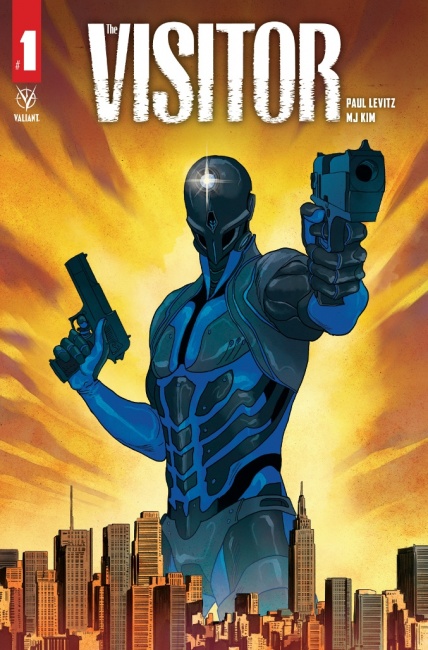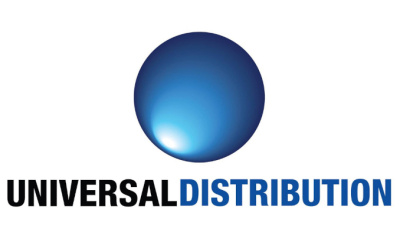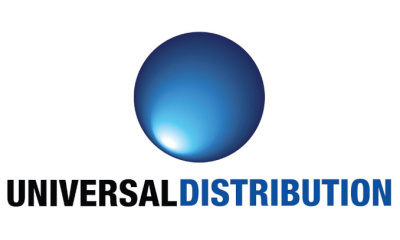In Business 3x3, a business retailer or executive will share their experience with three things they’ve done right, three things they’ve done wrong, and what else they’ve learned along the way.
Paul Levitz enjoyed an almost 40-year career at DC Comics, starting off as what he calls the company’s "house fan" and ending up as president and publisher. Nowadays?
"I’m lucky enough to be doing things that amuse me," Levitz says.
Levitz spends his time teaching college and grad school courses at Pace University, Manhattanville College, and Columbia University ("A great kick for someone who’s a college dropout. It’s my little joyous revenge against the universe," he says) and doing a fair amount of writing. His new Valiant Entertainment series, The Visitor, hits on December 18 with a final order cutoff for retailers of November 25 (for art from #1, see "Preview: ‘The Visitor’ #1" and the cover gallery below).
Levitz also sits on the board of a few assorted charities, and does occasional consulting work. When he wants to, that is.
"When things come knocking at my door and they sound fun, I say 'sure,'" he says. "In all, I’ve had a bizarre, charmed life."
Along the line, he’s also learned a lot.
THE GOOD
APPLY THE "STAKEHOLDER THEORY"
Levitz takes a page from business school, and applies it to his professional life. He’s been doing it for decades.
"The business school thesis is that companies aren't just responsible to their owners, but to all the groups who have a stake in their enterprise," he says. "In our case, our readers, our retailers, our distributors, our suppliers, our creators and our employees. Over the decades that I had a role in DC's management, we worked hard to make things better for all of these groups, and although some decisions were zero-sum situations where everyone couldn't benefit equally, I know the field couldn't have grown as beautifully as it did in that time unless we had done this."
Levitz sees many of his stakeholder seeds still bearing fruit today.
"The investments we made in early royalty plans, improving the ways comics and graphic novels reached readers, and building the systems the whole industry adopted were necessary steps for making the future work."
BUILD THE DIVERSITY BANDWAGON
It’s very 2019, but Levitz says he’s been "supporting diversity before it was a buzzword." He’s also quick to give credit where credit is due.
"The largest share of the credit for this goes to [Levitz’ predecessor as DC President] Jenette Kahn, not me, as she was a living beacon of diversity as the first woman and outsider to head one of the big superhero comics publishers," he says. "Her existence helped us attract women as executives, staffers and talent, and she championed repeated experiments to the bring comics to different audiences."|
DC’s Vertigo imprint, of course, passed a long test of time, but Levitz also sees value in some of the projects he and Kahn championed that diversified the audience, but didn’t last as long.
"Piranha, Paradox, Milestone, and Minx, to name a few, each had some lasting effect on comics either by bringing in new creators, showing that comics could be the seed of movies that weren't ‘comic book movies,’ or creating lasting characters and concepts," Levitz says.
KNOW YOUR LIMITS (MOSTLY)
As DC’s president and publisher, Levitz could have also taken on the title of DC’s editor-in-chief. But it was a role he avoided.
"I knew that if I crossed the line of feeling directly responsible for the content of all the comics, there was a real danger both of imposing my own point of view and limiting that of others, or having our editorial leaders constantly second guessing what I wanted them to do,” Levitz says. "As someone who was a comics fan, writer, and former editor—and never short of opinions—I always felt this would be much more dangerous for me than it was with Jenette, who came in and continued to manage the creative process from a more distant perspective."
THE BAD
KEEP YOUR EYES OPEN, ALWAYS
Levitz liked getting a ground-level pulse, but slept on it once, and it cost him.
"Whereas I had one of he great jobs on the planet, I hated business travel," he says. I spent about 50 nights a year in hotel rooms." And so Levitz took a year off from attending conventions circa 1992, and missed something big.
"I missed seeing the early enthusiasm the readers had for Image Comics," he says. "Kids loved the sincerity and the passion that was coming through in the Image books, and that flavor became very popular for a while. We had a very hard time getting our editorial team to produce anything in that kind of style, and it took us longer to react as a result."
Levitz felt he was due a year off. But the timing snakebit him.
"San Diego in particular was always useful for me in understanding the tides of what the readership liked," he says. "The doors would open, and in years that DC was doing well, the crowd would flow right into our booth with enthusiasm. And in years when we weren’t doing as well, Moses would part the Red Sea and they’d be going off somewhere else. I missed watching their reaction to Image in that (for more on this incident, see a column by Levitz, "Watching Changing Tides").
INSTITUTIONALIZE NOW SO YOU DON’T SPIKE LATER
You churn out a kajillion books over 35+ years, and you’re bound to wind up with some egg on your face. Notably, DC went to print on The League of Extraordinary Gentlemen #5, which contained a Victorian Era-styled ad for a "Marvel douche" before destroying the run and reprinting, and also published six issues of The Boys, a dark send-up of DC’s own Justice League before deciding it didn’t want to be in that business. Levitz owns ’em all. "I've taken a fair amount of heat for instances where management stepped in to alter or even destroy projects at late stages, and while I generally think the decisions were necessary based on the different situations, there's no question that it would have been better if we had put in place guidelines or systems that surfaced the concerns earlier in the editorial process," he says.
The later you get, the worse it gets. And the cost can run high.
"When we did the [1996] DC/Marvel/Amalgam stuff, the original deal called for no house ads of our own stuff in the books," Levitz remembers. "The guys who were responsible for that stuff blew it, and the original print run included house ads. I remember standing in Grand Central trying to call the office on a pay phone, that technology being what it was in those days, having just read the fresh-off-the-press copies and saying, ‘Guys, we have to fix this; we promised.’ And that was a fuckin’ forest worth of trees that we had to use again to reprint. But that was our screw-up."
HIRE RIGHT
No matter where you are, getting the right people and putting them in the right places is key.
"Overall, I'm incredibly proud of our HR processes during the time I had some influence on them,” Levitz says. "We had many incredible hires, exhibit A being Karen Berger, and lots of people who grew within the company and went on to be talented creators in comics and beyond, such as Cliff Chiang and Julie Rottenberg. But I certainly didn't bat 1.000 in the hires I made, or always succeed in identifying situations early enough that became problematic. Still not sure how I could have done better at this, but if I had a do-over, I'd certainly try."
AND WHAT ELSE?
"Projects the boss brings in to a publishing company can easily be orphaned, even if they're wonderful. If you build a system driven by editorial champions, adoption in utero is a requirement."
"Little things can matter a lot. One of the shticks that I enjoyed was when we put out new statues or new action figures in the DC Direct line, if we came out with one that seemed particularly reminiscent of something to me, I’d send one to, say, I’m thinking of Jim Aparo with a little note that might say, ‘Hey, we just did this, and it made me smile, thinking of the old Aquaman stories we did together.’ It takes three seconds to do, and it comes at no economic cost to the company that you can measure without a microscope. But on several occasions, Aparo being one of them, years later we’d be at funerals or other such gatherings, and family members would remark how good that person felt when that came in the mail and how important it was to them.
"You know, the stuff you owe people, whether it’s cash or copies, yeah, it’s important to send that out and do it on time. Fulfill whatever your obligations are. But when you send something outside the obligation, and it’s a nice surprise… yeah, it can matter a lot. I was frankly surprised on those occasions with reactions I got to that, often years later.
"The longer time frame you can think in, the more opportunity you have to build a future you believe in."
Click Gallery below for covers for Visitor #1!

Former DC President and Publisher Reflects on High and Low Points from His Time at DC
Posted by Jim McLauchlin on November 12, 2019 @ 5:16 pm CT
MORE COMICS
The Acquisition, the Ownership Transition, Coming Changes, Supplier and Retailer Relationships
July 9, 2025
In Part 1, we talk about the acquisition process, the ownership transition, coming changes, and supplier and retailer relationships.
Plans for Comics, Approach to the Market, Handling Preorders, Diamond UK, Other Categories
July 9, 2025
In Part 2, we talk about Universal's plans for comic distribution, its approach to that market, handling preorders, Diamond UK, and other categories.
MORE NEWS
Players Can Match Symbols Inspired by the Hit Animated Series
July 9, 2025
Asmodee will release Spot It! Bluey (Eco Blister) , a new version of the hit matching game by Zygomatic, into retail.
WotC Takes a Page Out of 'Topps Now's' Parallels Playbook for DTC Card Sets
July 9, 2025
Wizards of the Coast unveiled bonus cards for the upcoming Secret Lair X Sonic the Hedgehog drop sets.





 View Gallery: 4 Images
View Gallery: 4 Images 



